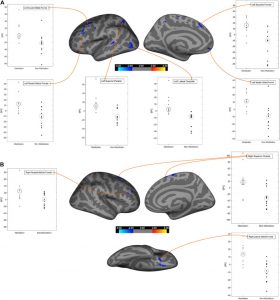Protect the Brain from Dementia-Related Deterioration with Meditation
By John M. de Castro, Ph.D.
“the group who performed meditation and yoga at least two hours per week had less atrophy in parts of the brain and better brain connectivity than the control group.
This finding gives them hope that the practice of meditation and yoga may slow the progression of Alzheimer’s.” – Alissa Sauer
The aging process involves a systematic progressive decline in every system in the body, the brain included. The elderly frequently have problems with attention, thinking, and memory, known as mild cognitive impairment. An encouraging new development is that mindfulness practices such as meditation training and mindful movement practices can significantly reduce these declines in cognitive ability. In addition, it has been found that mindfulness practices reduce the deterioration of the brain that occurs with aging restraining the loss of neural tissue.
In today’s Research News article “Effects of Meditation on Structural Changes of the Brain in Patients With Mild Cognitive Impairment or Alzheimer’s Disease Dementia.” (See summary below or view the full text of the study at: https://www.ncbi.nlm.nih.gov/pmc/articles/PMC8633496/ ) Dwivedi and colleagues recruited patients between the ages of 45 and 70 years of age who were diagnosed with mild cognitive impairment or probable Alzheimer’s disease. They were assigned to usual care or to receive 6 months of daily 30-minutes sessions of either meditation practice or non-meditation focused task. Before and after the 6-month intervention they underwent detailed clinical and neuropsychological assessment and Magnetic Resonance Imaging (MRI) of the brain.
They found that in comparison to baseline and the control groups the meditation group had significantly higher cortical thickness and gray matter volume in the left caudal and rostral middle frontal areas and significantly higher gray matter volume in left lateral occipital, right inferior parietal, and right superior frontal cortices and significantly lower cortical thickness and gray matter volume in the entorhinal cortex and posterior parts of the brain. On the subcortical level they found increased volume in the right thalamus and the hippocampus. There were no significant differences between groups in clinical and neuropsychological measures.
The results suggest that 6-months of meditation practice protects the brain from deterioration in patients diagnosed with mild cognitive impairment or probable Alzheimer’s disease. This suggests that meditation may help to prevent the cognitive decline that occurs with these diseases. It is unfortunate, though, that no significant differences were found in the clinical and neuropsychological measures. The scores, however, did not appear to change significantly between baseline and the follow up assessments. So, there simply may not have been enough time for cognitive decline to be detectable in the patients. Regardless, it is clear that meditation has neuroprotective effects in patients showing early signs of dementia.
So, protect the brain from dementia-related deterioration with meditation.
“ indicators of Alzheimer’s disease. Results showed that those who practiced meditation saw major changes in the biological markers that would put them at a higher risk for Alzheimer’s disease by the end of the study, with the same participants reporting improvements in cognitive function, sleep, mood, and quality of life.” – Kim Innes
CMCS – Center for Mindfulness and Contemplative Studies
This and other Contemplative Studies posts are available on Twitter @MindfulResearch
Study Summary
Dwivedi, M., Dubey, N., Pansari, A. J., Bapi, R. S., Das, M., Guha, M., Banerjee, R., Pramanick, G., Basu, J., & Ghosh, A. (2021). Effects of Meditation on Structural Changes of the Brain in Patients With Mild Cognitive Impairment or Alzheimer’s Disease Dementia. Frontiers in human neuroscience, 15, 728993. https://doi.org/10.3389/fnhum.2021.728993
Abstract
Previous cross-sectional studies reported positive effects of meditation on the brain areas related to attention and executive function in the healthy elderly population. Effects of long-term regular meditation in persons with mild cognitive impairment (MCI) and Alzheimer’s disease dementia (AD) have rarely been studied. In this study, we explored changes in cortical thickness and gray matter volume in meditation-naïve persons with MCI or mild AD after long-term meditation intervention. MCI or mild AD patients underwent detailed clinical and neuropsychological assessment and were assigned into meditation or non-meditation groups. High resolution T1-weighted magnetic resonance images (MRI) were acquired at baseline and after 6 months. Longitudinal symmetrized percentage changes (SPC) in cortical thickness and gray matter volume were estimated. Left caudal middle frontal, left rostral middle frontal, left superior parietal, right lateral orbitofrontal, and right superior frontal cortices showed changes in both cortical thickness and gray matter volume; the left paracentral cortex showed changes in cortical thickness; the left lateral occipital, left superior frontal, left banks of the superior temporal sulcus (bankssts), and left medial orbitofrontal cortices showed changes in gray matter volume. All these areas exhibited significantly higher SPC values in meditators as compared to non-meditators. Conversely, the left lateral occipital, and right posterior cingulate cortices showed significantly lower SPC values for cortical thickness in the meditators. In hippocampal subfields analysis, we observed significantly higher SPC in gray matter volume of the left CA1, molecular layer HP, and CA3 with a trend for increased gray matter volume in most other areas. No significant changes were found for the hippocampal subfields in the right hemisphere. Analysis of the subcortical structures revealed significantly increased volume in the right thalamus in the meditation group. The results of the study point out that long-term meditation practice in persons with MCI or mild AD leads to salutary changes in cortical thickness and gray matter volumes. Most of these changes were observed in the brain areas related to executive control and memory that are prominently at risk in neurodegenerative diseases.
https://www.ncbi.nlm.nih.gov/pmc/articles/PMC8633496/
